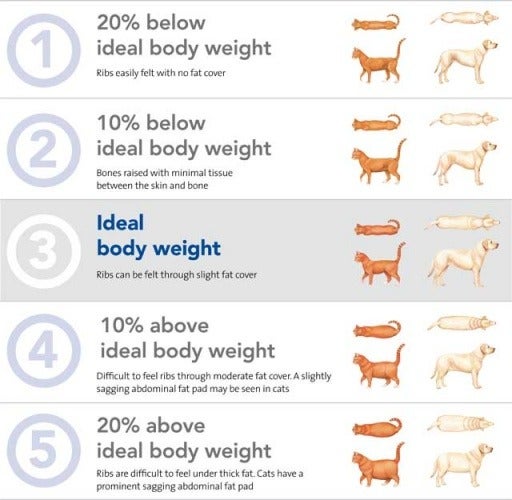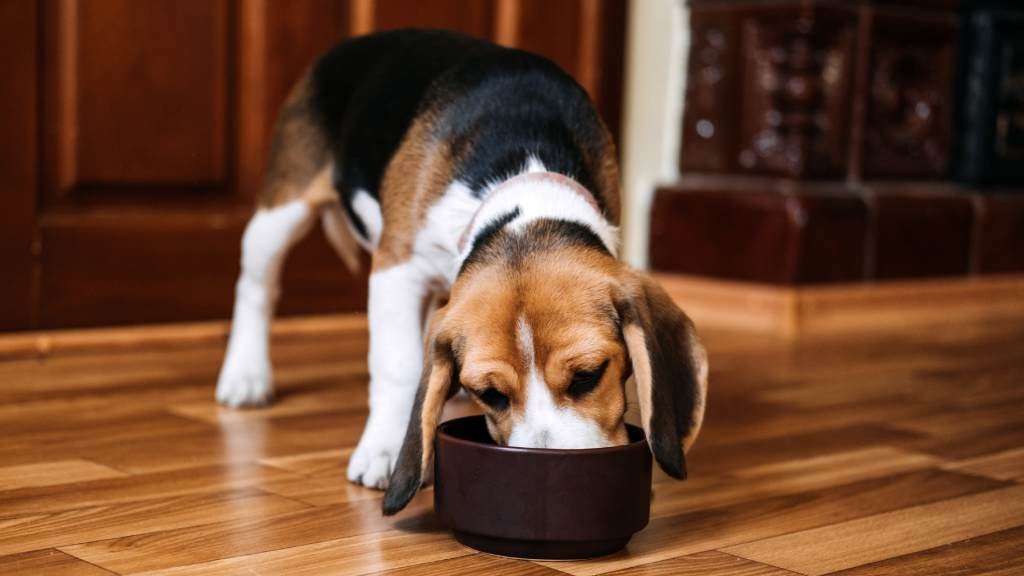There are a number of potential diets for dogs, but it can be hard to determine which one is best for your four-legged friend. To help you make an informed decision, keep these factors in mind when deciding what to feed your dog.
What dogs eat
It’s important to remember all dogs are individuals, and what diet might be fine for your friend’s dog may be completely inappropriate for your dog. When it comes to a daily diet for your dog, it’s important to consult with your vet.
Domesticated dogs are largely carnivores that eat some omnivorous foods. Dr Leigh from Your Vet Online advises that it is important to ensure your dog’s food is both complete and balanced for its stage of life, and if it has any medical issues.
It is entirely acceptable to feed your dog a pure kibble diet. Or you can mix their diet up with some cooked or raw meat, fish, vegetables and rice.
Many owners like to feed a raw meat diet to their dogs, and while this can suit some dogs very well, there are some important considerations you need to be aware of. Experienced vet Dr Leigh Davidson suggests the following.
- Choose human-grade meat as some pet meat and bone products will contain preservatives that can be bad for your dog’s health.
- Practice impeccable food hygiene as the risk of both you and your dog getting a food-borne bacterial infection such as campylobacter or salmonella is high.
- Have a veterinary nutritionist formulate the diet for you. Many raw diets are not balanced appropriately for stage of life or medical conditions.
A small amount of cooked meat such as boiled chicken or lamb is an option for dogs to eat, but avoid cooked bones or toxic substances such as onion sauces that may be present on the meat.
Tinned sardines, tinned tuna, and tinned salmon in spring water can be fed as an occasional treat to your dog, but always check for fish bones first.
Don’t be scared to bulk out your dog’s meal with cooked pumpkin or raw grated carrot. According to Dr Leigh, many dogs lack enough fibre in their diet, and the addition of cooked pumpkin or grated carrot can improve their bowel health.
Be careful to make sure your dog isn’t consuming the whole bone as this can lead to constipation.
Generally, one to two bones a week is sufficient to help remove plaque from teeth. Remember, the bone should be large enough that the dog can’t fit it in its mouth whole, and they should be raw – cooked bone can splinter, which can cause internal damage or obstruct the intestine, both of which can be fatal.
For more information on how to feed your dog bones, visit the RSPCA Australia knowledge base.
How much food your dog needs
The amount of food your dog needs will largely depend on the size, breed and age of your dog, as well as how regularly it exercises. The key is to ensure you don’t overfeed or underfeed your dog. If ever you’re unsure, ask your vet to assess your dog’s diet and nutrition, and the condition of its body and overall health.
Always ensure your dog is well hydrated. This means making sure their water bowl is filled up at all times and is changed daily, so they can help themselves to water whenever they need or want.
When assessing your dog’s size and weight, it is far more important to look at their body shape than weight. You want your dog to be lean, which means you should be able to feel their ribs when you run your fingers firmly over their side and see a defined waist. If this isn’t possible, it’s diet time. Obesity in dogs is linked to decreased longevity and diseases such as osteoarthritis, and it is totally preventable.

Image supplied by Hill’s Prescription Diet ~ Clinical Nutrition to Improve Quality of Life
Food in relation to your dog’s age
8–16 weeks
This is the age when many pups will enter their new home. It’s important to not make huge diet changes at this time as you might inadvertently cause a stomach upset.
Many breeders will tell you what they have been feeding your dog. Ideally, you will continue with this, and introduce the diet you wish to feed them in small incremental stages over a few weeks until you are feeding your pup your preferred diet completely.
The best food to feed is a high quality commercial kibble designed for puppies. This ensures all the nutrients your puppy needs for growth and development are present.
You can add cooked meats and vegetables or rice as you wish; however, the main diet needs to be the commercially balanced kibble.
Raw diets are not recommended for very young pups as they don’t have the immune system development to cope with a high bacterial load. It is also very difficult to balance a raw diet for growing puppies.
Puppies have a high nutritional demand and can’t go for long without food. It’s very important to feed small meals regularly.

16+ weeks
At the 16-week mark, feel free to introduce some raw meaty bones gradually. It’s around this time that permanent teeth are erupting, so this encourages them to chew actively on something other than your shoes or couch (it won’t affect or benefit teeth health at all). For puppies, one bone a week is generally enough; and remember, the meatier – the better.
Don’t be alarmed if your puppy becomes possessive over its food when it’s eating. Always discourage children from getting too close to them when they’re eating, and be aware they may growl or snap at you if you attempt to take the food away. You can prevent the development of food guarding by handfeeding your pup in the early stages. If your pup already guards, please seek help from a veterinarian.
When you’re introducing a new food to your pup, keep an eye on it at all times for any signs of illness or distress. Like humans, dogs can have intolerances or be allergic to things, or a certain food simply may not agree with your pup. Note down what it is you fed your puppy if a reaction or illness occurs and pop that on the no-feed list.
As your pup gets older, you can gradually reduce the number of feeds to twice per day. Try to ensure you aren’t overfeeding or underfeeding your dog. It can be tricky as most people will assume bigger breeds need more to eat; however, this isn’t always the case. Overfeeding your puppy can lead to health issues such as musculoskeletal problems later in its life.
Adult dogs
Adult dogs should be fed either once or twice a day. Use a high-quality commercial dog food, making sure it’s appropriate for the life stage and health status of your dog.
Small or medium breed dogs are generally deemed to be ’adults’ from 12 months of age, whereas your larger breed dogs take a little longer and don’t really become ‘adults’ until 18–24 months.
Check with your veterinarian when to change over from puppy-appropriate food to adult-appropriate food.
The same feeding guidelines apply to adult dogs. Ensure the diet you choose is complete and balanced. You can add meat (cooked or raw), and vegetables or fish for variety. Choose large, raw, meaty bones. Most importantly, don’t over feed.
Senior dogs
For senior dogs, the need to keep tabs on their health is crucial. Many older dogs have chronic health issues that can be affected or improved by the diet you feed.
For some senior dogs, frequent smaller meals will keep them happy and satisfied. For others, it’s about keeping things the same as before. Some senior dogs may need more fibre, protein or other nutrients to ensure their bodies are taken care of. Speak to your veterinarian about your dog’s specific needs.
Keep certain foods out of reach
When it comes to your pets, not everything people eat is safe for them. It’s important to know that while this list is not comprehensive, these are the most common household foods that you’ll need to protect your pup from.
Chocolate
While dogs love the smell of chocolate, it’s toxic for them, and should never be fed to them.
Onions and garlic
Onions are very toxic to dogs. They cause oxidative damage to the red blood cells causing them to rupture leading to anaemia.
Citrus
The citric acid found in fruits such as grapefruit, lemon, lime and orange, can cause diarrhoea, vomiting and at the very worst end of the scale, depression of the central nervous system.
Milk and lactose
Some dogs may be lactose intolerant, resulting in stomach upsets like vomiting or diarrhoea. If your dog reacts strongly to milk products, it’s best to avoid them.
Raw yeast dough
While your dog can have small bits of bread, raw dough is definitely a no-no. As the yeast rises, it can cause gas in the dog’s digestive system, which is painful and may potentially rupture its stomach or cause gastric dilation and volvulus.
Fatty foods
If you’re looking at maintaining a healthy weight for your dog, sweet and fatty foods should be avoided. Also, fatty foods can lead to illnesses such as pancreatitis.
Salty foods
Salt is an essential component to your dog’s diet helping muscle and nerve function. However, some dogs with chronic disease such as kidney, heart or liver problems may need to watch their salt consumption. It is always important to get advice from your vet regarding the diet of your pet.
If your dog snacks on something it shouldn’t, pet insurance is one way you can ensure they get the professional help they need along with a financial helping hand for vet bills. RSPCA Pet Insurance for dogs is affordable and flexible, with first year of premiums helping support the RSPCA.
28 Feb 2019

